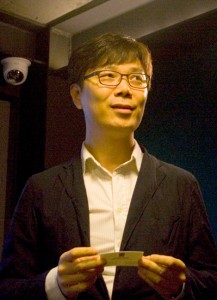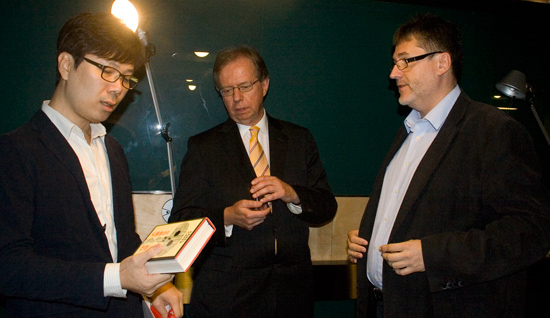 On September 17th, at the Scandanavia Design House in Apgujeong, the Seoul Literary Society (a function of the Swedish Embassy in Seoul) Kim Young-ha gave a speech on the things in his youth that affected his writing, and then answered questions from the audience. KTLIT was there, with the handy-dandy iPhone and camera, and recorded the following files.
On September 17th, at the Scandanavia Design House in Apgujeong, the Seoul Literary Society (a function of the Swedish Embassy in Seoul) Kim Young-ha gave a speech on the things in his youth that affected his writing, and then answered questions from the audience. KTLIT was there, with the handy-dandy iPhone and camera, and recorded the following files.
The first video talks a little bit about why he writes (and is quite jumpy!):
The sound file (really quite difficult to hear) discusses his upbringing and how that affected the nature of the work. It is in Korean, then translated to English, and I have summarized it below.
https://www.ktlit.com/wp-content/uploads/2012/09/kim11.mp3
for iPhone or download
Kim Young-ha explains how growing up in the DMZ affected his impressions of Korea(s) as a youth. Essentially, it brought him to the state of mind that life was performative. He also saw North Korea and South Korea as distorted mirror images of each other up until the 90’s, when South Korea became an entirely different country. But the idea that he knew 2 people who actually wanted to go to North Korea and this affected his writing in two specific instances – in I Have the Right to Destroy Myself he portrayed a character who chooses death out of his own free will; the second case in Your Republic is Calling You has a character who also has to make a decision to return to that land of strangeness (North Korea).
He also remembers, living near the DMZ, how he got North Korean television stations (LOL, says only one female did ALL the voice-overs). Here was where the theatricality and staged nature of life first became clear to Kim.
Later on, he went on to University, and the North Korean ideology was quite popular at that time and Kim came across a book by Kim Jong-il “accidentally on purpose” which thoroughly convinced him of the cinematic nature of North Korea life.

Kim Young-ha, Swedish Ambassador Danielsson, Czech Ambassador Olsa – giving Kim a book, that I bet is by Kafka!
But he also realized that the farcical nature of North Korea was not that different from that in South Korea. Kim noted that he too, for several years, had to dress up like a soldier, and once a year, for a week, return to that charade and this made him think of South and North Korea as twins.
Kim told the story of the competing heights of the Korean flags at the DMZ going on until the South Koreans realized it was stupid and just quit. Even today, the North Korean flag flies ridiculously high. Still, at the DMZ, the theatrical act continues. Mentioned that both countries have Potemkin Villages at the DMZ (Kijeong-dong in North Korea, and Daesong-dong in South Korea)and that if you live in the South Korean one, you don’t need to pay taxes, or do military service if you are a man.
So all this developed Kim’s perspective as life as a part of theater, and underneath all that was a layer of comedy, something very farcical. Kim then told the story of North Korean soldiers dragging a live pig and cutting its throat in front of the South Koreans to prove their masculinity and to show they were going to eat well. This also made Kim realize that life was essentially a comedy.
So there were two Koreas that were very similar in the 80’s, but they started to go very different in the 90’s, particularly in the fact that South Korea westernized and competition become sharper and sharper. Kim explains three countries (in Republic), North Korea in the 80s, South Korea in the 80s and South Korea since the 90’s.
Actually before he wrote Your Republic is Calling You he wasn’t sure why he was writing it, it wasn’t until afterwards that he realized that to understand South Korea we have to not only understand South Korea, but reflect on what goes on in North Korea.
Going back to why he wrote this novel. He heard about a group of people who disappeared into the countryside, and in I Have The Right to Destroy Myself he wrote about a character who has a very confused search for his identity. All his writing comes through this perspective.
Part II will follow, with the Q&A session


